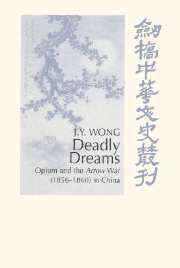Book contents
- Frontmatter
- Contents
- List of Tables
- List of Figures
- Poem by the late Mr Qin Esheng
- Foreword by Professor Wang Gungwu
- Foreword by Professor C. A. Bayly
- Preface
- Part I The confusion of imperialism
- Part II The pretext for imperialism
- Part III The personalities of imperialism
- Part IV The rhetoric of imperialism
- Part V The mechanics of imperialism
- Part VI The economics of imperialism
- Part VII The dynamics of imperialism
- Chronology of major events
- Word list
- Abbreviations
- Bibliography
- Index
Part III - The personalities of imperialism
Published online by Cambridge University Press: 29 September 2009
- Frontmatter
- Contents
- List of Tables
- List of Figures
- Poem by the late Mr Qin Esheng
- Foreword by Professor Wang Gungwu
- Foreword by Professor C. A. Bayly
- Preface
- Part I The confusion of imperialism
- Part II The pretext for imperialism
- Part III The personalities of imperialism
- Part IV The rhetoric of imperialism
- Part V The mechanics of imperialism
- Part VI The economics of imperialism
- Part VII The dynamics of imperialism
- Chronology of major events
- Word list
- Abbreviations
- Bibliography
- Index
Summary
The available evidence suggests that neither the British nor the Chinese government had expected that the Arrow incident would lead to war. In this respect, Chapters 3–5 will show how crucial were the personalities of Parkes and Bowring, and of Yeh in response. The Arrow War might have been waged in a different manner and under a different name if Whitehall had had an opportunity to examine the military action proposed by Parkes and endorsed by Bowring. But Whitehall did not, because it was about four months by return mail from Hong Kong. Thus, it was obliged, for political reasons, to approve retrospectively the actions of its men. It was the ‘tyranny of distance’ which allowed the personalities of imperialism to manifest themselves so fully.
These personalities involved not only the British officials, but also the British crowd at Canton. This crowd included some reckless British merchants, as well as drunken sailors and thugs. Propelled by the ascendancy of Britain as a world power, this crowd was exceptionally aggressive and bellicose, so much so that the British authorities often despaired of making them behave sensibly. It was ‘Rule, Britannia’ in the worst possible form. The British crowd was met by a fiercely defiant Cantonese populace, whom the Chinese officials had lost hope of controlling since the Opium War, and whose wishes they had been cajoled to respect: ‘Vox populi, vox Dei.’ This unusual aspect will be dealt with in Chapter 6.
- Type
- Chapter
- Information
- Deadly DreamsOpium and the Arrow War (1856–1860) in China, pp. 67 - 68Publisher: Cambridge University PressPrint publication year: 1998



